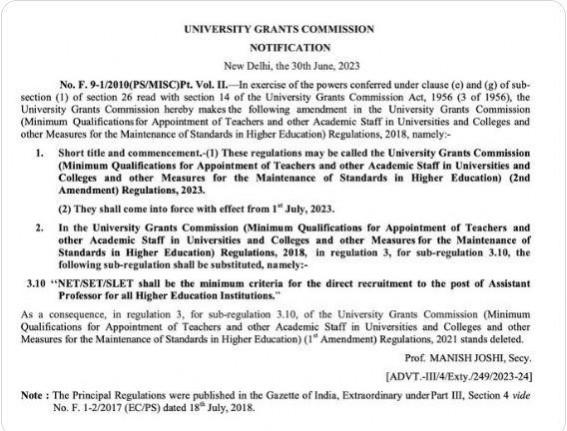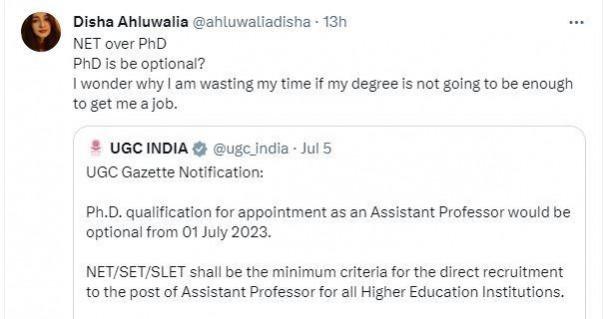In a decision that has the alumni and aspirants almost divided, the University Grants Commission on Wednesday eased out the criteria for the appointment of assistant professors in colleges and universities.
With effect from July 2023, PhD degree will not be mandatory for teaching jobs in colleges and universities. The decision is a reversal of UGC's earlier regulation which made PhD mandatory for teaching posts in institutions of higher education.
![[Representational Image] graduation](https://data1.ibtimes.co.in/en/full/686151/graduation.jpg?w=959&h=382&l=50&t=40)
The notification
Explaining the notification via its official social media accounts, the UGC said, "PhD qualification for appointment as Assistant Professor is now optional from July 1, 2023." It also clarified that, "NET/SLET/SET shall be the minimum criteria for the direct recruitment to the post of assistant professor for all higher education institutions." The notice also added, "Depending on the disciplines, institutions can decide the shortlisting criteria above the minimum specified by the UGC."

Some happy, others are not
While the teachers' organisations welcomed the decision and said it was long due and they had been demanding that the UGC withdraw its 2018 regulation, but many others expressed their concern. "At a time when the bar for higher education needs to be set higher, need to be made more selective and stringent, we have dropped the minimum qualifications," wrote a user questioning the real benefit of the move.
Technically speaking, the new amendments come into force from the 1st of July, 2023. Accordingly, the previous UGC regulation which made PhD mandatory for the post of assistant professors has been removed.
The notification said, "Minimum Qualifications for Appointment of Teachers and Other Academic Staff in Universities and Colleges and other Measures for the Maintenance of Standards in Higher Education Regulations, 2018, have been amended." Reportedly, the Education Ministry was not too keen on the regulation that made PhD mandatory for teaching posts.
Doctorates not happy with the decision
Many expressed concern over a big pause in further R&D, investment in academic pursuits and the value of a PhD. Shared a user, "It is unfortunate for a country like India to have such type of decision for appointments of Assistant Professors in the higher education institutions. On one hand we talk about limited R & D, and development activities in India while on the other hand such decisions are taken."
When IB Times got in touch with doctorates currently imparting higher education in various institutions across the nation, they were not just unhappy, but disillusioned with UGC reversing its own 2018-regulation.
'We're diluting the quality of education'
"I'm personally not in favour of this decision. Without a PhD, there may be a lack of in-depth knowledge and research skills necessary for imparting comprehensive education to students. It is through the process of pursuing a doctorate that individuals develop valuable skills such as research methodology, analytical thinking, and the ability to contribute to the body of knowledge in their respective disciplines. Moreover, removing this requirement may discourage aspiring scholars from pursuing advanced degrees and hinder the growth of research and innovation in the academic community. It also risks diluting the quality of education and diminishing the value of expertise and research within the academic community," said Dr. Amreen Sekhon, faculty, Department of Psychology, Panjab University, Chandigarh.
'Research skills should be the main criteria for hiring faculty'
When it comes pursuing or imparting higher education, how can research be made an option, in the first place? "For the post of assistant professor, two major requirements should be, their teaching experience and research skills. A PhD highlights the research aptitude of the candidate but an exam like NET etc gives a minor indication of his aptitude for teaching capabilities. Higher educational institutes should definitely not allow a non-PhD to be a part of of the faculty as they are supposed to upift the research quality of their institute," opines a professor from Department of Mathematics, IIT Kanpur, requesting anonymity.
'Do we want thinkers and innovatiors or do we want teachers?'
The philosophy of 'you reap what you sow' couldn't be more apt than in the field of education. In a nation of 1.4 billion, we have a handful of PhDs and now that stands to further get discouraged. "In order to make a developing nation like India successful, we not just need to match the global standards but we also need to compete their scientific and technical pace. This can only happen if we uplift the level of education and not dilute it. After all, we don't just need to create degree holders, we need thinkers and innovators and that can be best achieved by recruiting researchers and not merely teachers," opines Dr. Surinder Kaur, Research Associate, IIT Kanpur, while refusing to directly comment on the UGC decision.
'It would expedite the employment opportunities'
On the other hand there are also those celebrating the relaxation in minimum qualifications. "Clearing a national-level exam such as UGC/NET/JRF stands testimony to the expertise and competence of the individual in the concerned subject. Besides, since courses such as MA English and LLM are research based degrees, it ensures the candidate has necessary research experience in the chosen field. In such a scenario, one is free to work on his/her PhD Thesis and continue getting one's original research papers published in UGC CARE-listed journals even after landing in a regular job as an Assistant Professor. I welcome the move as it would expedite employment opportunities for UGC NET-qualified candidates eyeing teaching posiitons," opines Manika Ahuja, UGC, NET, JRF in English Literature and currently pursuing PhD from Panjab University, Chandigarh.




















